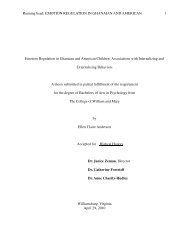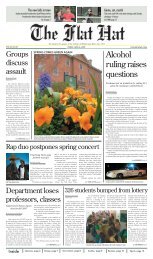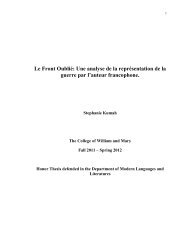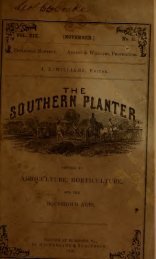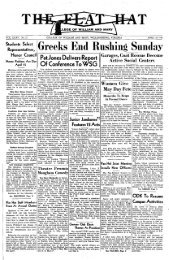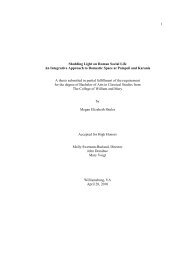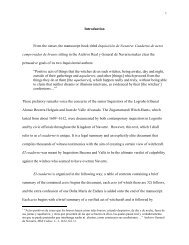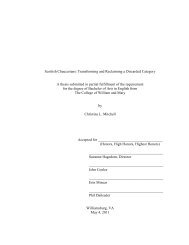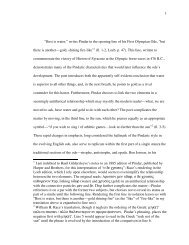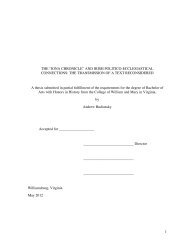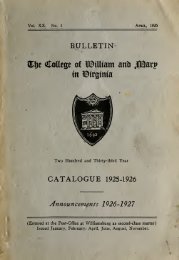Southern planter : devoted to agriculture, horticulture, and the ...
Southern planter : devoted to agriculture, horticulture, and the ...
Southern planter : devoted to agriculture, horticulture, and the ...
Create successful ePaper yourself
Turn your PDF publications into a flip-book with our unique Google optimized e-Paper software.
THE SOUTHERN PLANTER. 447<br />
\v']\] be purged oflT. The above figures show<br />
that <strong>the</strong> amount of credits outst<strong>and</strong>ing at<br />
<strong>the</strong> time of <strong>the</strong> panic was in no degree<br />
sufficient <strong>to</strong> produce such a result.— U. S.<br />
Economist.<br />
British Agriculture.<br />
The addresses <strong>to</strong> <strong>the</strong> members of <strong>the</strong><br />
Surrey Agricultural Association at <strong>the</strong> annual<br />
meetings contain a great deal of useful<br />
information indicative of <strong>the</strong> progress<br />
<strong>and</strong> present stage of British Agriculture.<br />
The following passages may be taken as a<br />
sample of its quality:<br />
"There are, I believe, about twentynine<br />
millions of inhabitants in <strong>the</strong> United<br />
Kingdom, <strong>and</strong> <strong>the</strong> population is increasing,<br />
it is estimated, at <strong>the</strong> rate of one thous<strong>and</strong><br />
a day. There are, it is calculated, seventyseven<br />
millions of acres, at a rental of one<br />
hundred <strong>and</strong> twenty-seven millions of<br />
pounds sterling per annum, in <strong>the</strong> area of<br />
<strong>the</strong>se kingdoms, fourteen millions of which<br />
are unimprovable waste, but twelve <strong>and</strong> a<br />
half millions are uncultivated, but improv-<br />
able l<strong>and</strong> ;<br />
<strong>and</strong> we are said <strong>to</strong> grow, on an<br />
average, fitty-one million quarters of corn,<br />
<strong>and</strong> this corn crop is reckoned <strong>to</strong> be an<br />
average worth one hundred <strong>and</strong> twenty<br />
millions pounds sterling per annum. In<br />
Engl<strong>and</strong> we have a population of eighteen<br />
or nineteen millions, <strong>and</strong> we grow about<br />
thirteen or fourteen million quarters of<br />
wheat ; <strong>and</strong> taking <strong>the</strong> estimate of consumption<br />
at one quarter per annum per in-<br />
dividual, made in Mr. Pitt's time, at <strong>the</strong><br />
instance 'of that eminent statesman, when<br />
wheat was 11. per bushel, we shall find<br />
that we have <strong>to</strong> import five million quarters<br />
of wheat annually for home consump-<br />
tion. Now <strong>the</strong> importation for <strong>the</strong> last six<br />
years was about 4| millions of quarters<br />
annual average, <strong>and</strong> for <strong>the</strong> previous six<br />
years four millions. In 18.56 we imported<br />
more than eight millions of corn <strong>and</strong> grain,<br />
of which above four millions were wheat,<br />
three-fourths million quarters Barley, more<br />
than 1 1-7 million quarters Oats, 3-8 mil-<br />
lion quarters of Beans, <strong>and</strong> nearly four<br />
million cwt. of meal <strong>and</strong> flour. Nor was<br />
that all <strong>the</strong> food which we brought from<br />
abroad. Our <strong>to</strong>tal annual consumption of<br />
butcher's meat amounts <strong>to</strong> 750,000 <strong>to</strong>ns.<br />
The sheep of <strong>the</strong> British Isles are believed<br />
<strong>to</strong> amount <strong>to</strong> thirty-five millions or more,<br />
of which Engl<strong>and</strong> possesses twenty-seven<br />
millions ;<br />
<strong>and</strong> of cattle in <strong>the</strong> United King-<br />
dom <strong>the</strong>re are eight millions. One quar-<br />
ter of <strong>the</strong>se sheep <strong>and</strong> cattle are said <strong>to</strong><br />
be consumed every year, <strong>and</strong> <strong>the</strong> value of<br />
each sort thus consumed is estimated at<br />
twenty million pounds sterling. Now, we<br />
import on an average of <strong>the</strong> last few years<br />
about 300,000 live animals, though during<br />
last year a smaller quantity, viz: 52,019<br />
oxen <strong>and</strong> bulls, 9,843 cows, 21,444 calves,<br />
135,588 sheep, 9,471 lambs, <strong>and</strong> 9,916<br />
swine <strong>and</strong> hogs— <strong>to</strong>tal 238,251 animals,<br />
mostly from Hollaml, Denmark, <strong>and</strong> <strong>the</strong><br />
Hanseatic <strong>to</strong>wns ; we import also about<br />
600,000 cwt. of meat, 400,000 cwt. of<br />
cheese, a like quantity, 400,000 cwt. of<br />
butter, besides a variety of 'o<strong>the</strong>r articles<br />
of food, <strong>to</strong> <strong>the</strong> aggregate value of fortyfive<br />
millions of pounds sterling. From<br />
this view of <strong>the</strong> largeness of our importations,<br />
we might be led <strong>to</strong> look forward with<br />
fear, <strong>to</strong> <strong>the</strong> occurrence of circumstances<br />
which might militate against our supply<br />
of food from abroad—such, for instance,<br />
as <strong>the</strong> increase <strong>and</strong> improved condition,<br />
<strong>and</strong> <strong>the</strong>refore increased consuming power,<br />
of <strong>the</strong> inhabitants of those countries from<br />
whence this supply is drawn ;<br />
but no such<br />
apprehension need, I think, be entertained,<br />
when we reflect upon <strong>the</strong> largely increasing<br />
amount of corn cultivation in countries<br />
where <strong>agriculture</strong> has not previously flour-<br />
ished, or think of <strong>the</strong> fertile l<strong>and</strong>s of <strong>the</strong><br />
American Far West, <strong>the</strong> improving <strong>agriculture</strong><br />
of more than one portion of Africa,<br />
<strong>the</strong> opening out <strong>the</strong> rich valley of Armenia<br />
by <strong>the</strong> proposed Euphrates Railway,<br />
or <strong>the</strong> many o<strong>the</strong>r places in which agricul-<br />
ture is improving—<strong>the</strong> certain effect of a<br />
constantly opening British market. At <strong>the</strong><br />
same time, I think that we should endeavor<br />
<strong>to</strong> do our utmost <strong>to</strong> grow fo)d for <strong>the</strong><br />
consumption of our own people. It was<br />
<strong>the</strong> opinion of <strong>the</strong> late Duke of Welling-<br />
<strong>to</strong>n, that we ought not <strong>to</strong> depend upon a<br />
foreign country for food ; <strong>and</strong> much, no<br />
doubt, niay be advanced in support of that<br />
proposition ; but I prefer <strong>to</strong> take lower<br />
ground, <strong>and</strong> <strong>to</strong> say if we can produce food<br />
at a profit let us do so. But <strong>the</strong> question<br />
will arise, How shall we best set about <strong>the</strong><br />
work of increasing our home supply of<br />
food? Shall we produce <strong>the</strong> requisite<br />
amount by putting in<strong>to</strong> cultivation <strong>the</strong> 12|<br />
million acres of l<strong>and</strong> lying waste, but improvable<br />
; or shall we apply ourselves <strong>to</strong><br />
increase <strong>the</strong> production of <strong>the</strong> l<strong>and</strong> under<br />
cultivation } My answer is, Let us do




